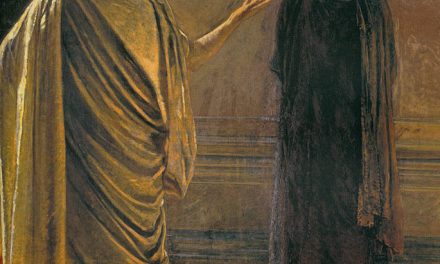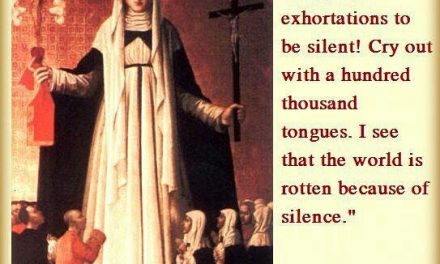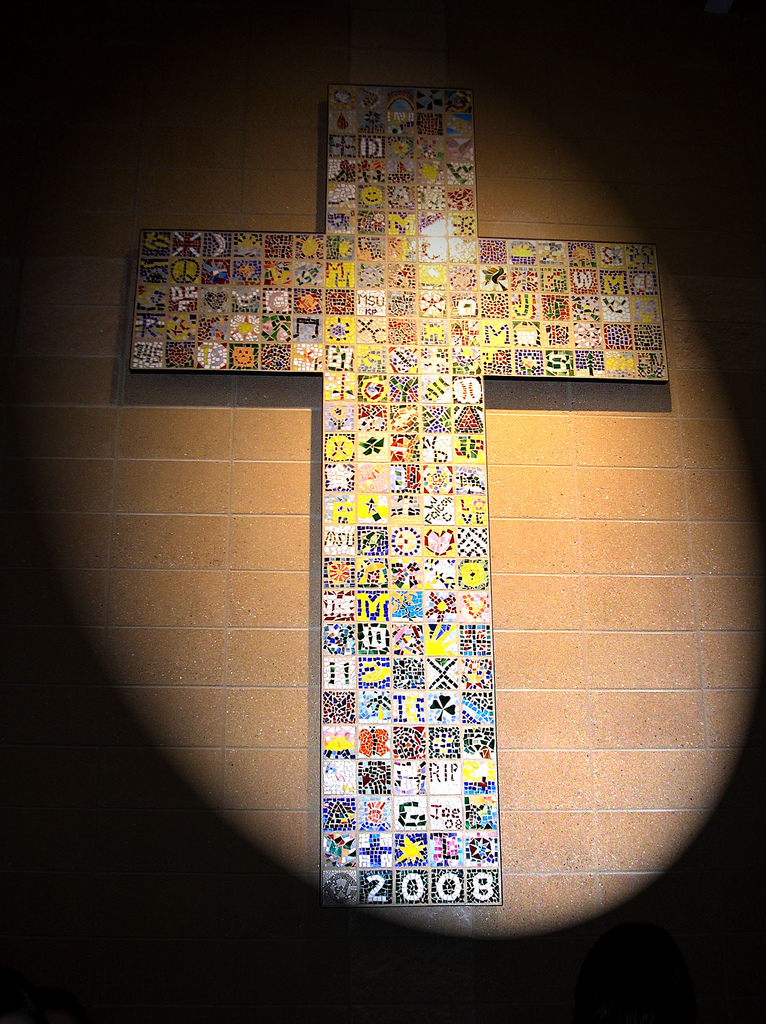As expected, the vice-presidential debate tonight included a question on what being Catholic means to each of the candidates. What I did not expect was that the question as asked would tie Catholic faith so exclusively to abortion. Martha Raddatz asked: How does being Catholic “affect your views on abortion?”
Asking the question in that way made it really easy to talk about Catholicism, because abortion holds so clear a line in church teaching.
But I fear that asking the question in that way also made it all too easy to talk about Catholicism, and therefore to dismiss Catholicism. When Catholicism=anti-abortion to the exclusion of anything else, then the Church becomes reduced to an “issue” in American politics. (Note: I am not here saying that abortion is a mere “issue” for the church, but I am saying that in American politics, abortion is nothing but a talking point aimed at getting people to vote for political parties, rather than parties actually doing anything about it.) So, political issues get to be just tossed around and used for the sole purpose of garnering political votes.
What that means for the Church is that Catholicism becomes nothing more than a mere prop to be brought out at appropriately staged scenes. It was my worry about the way the Church is getting used in politics that prompted me to help draft and sign the “On All Our Shoulders” document that has been signed by numerous other Catholic theologians and economists.
The thing is, and to both their credits, I think you could see that both candidates in their own ways strained against the view of the Church proposed by the question. Paul Ryan said:
I don’t see how a person can separate their public life from their private life, from their faith.
And Joe Biden suggested likewise that his faith affects everything he thinks, and made an attempt to broaden his answer to be about Catholic social teaching as well as abortion.
Catholic social doctrine talks about those who can’t take care of themselves…
That said, both candidates also answered the question in the parameters of the question asked – with the precise outcomes that we have come to expect given the US’s political architecture. Biden wants to make private his views on abortion, which thrills his base. He doesn’t think that his church’s views on abortion should be imposed on others. He doesn’t seem to catch the irony in his statement, however, in that his view toward helping the poor (which is part of his understanding of Catholic teaching) is “imposed” on others in a public way. With the one issue, it is okay to be private; with the other issue, it is necessary to bring the faith to the public square. By contrast, Ryan followed Romney’s lead to give an account against abortion that is not quite in line with church teachings. (Due to the way the question was asked, he did not have to answer the question some Catholics wonder about: how he understands his economic views vis a vis Catholic social teaching.)
What all this means is that both candidates discuss Catholicism and abortion in ways that effectively clip Catholicism. We knew this would happen. This was mere lip service to what it means to be “Catholic” while all the while putting forth particular political parties’ own views. Catholicism becomes merely an issue, and a one-dimensional issue at that.
How interesting it is that on this day when the vice-presidential debate truncates Catholic faith in its question on Catholicism, Catholics worldwide begin observing a Year of Faith. In his motu proprio on the Year of Faith, Pope Benedict XVI notes strongly that:
Profession of faith is an act both personal and communitarian.
And moreover, faith should lead to “public testimony and commitment” as well as “social responsibility for what one believes.” Most importantly, faith is “no theory, but an encounter with a Person” (Jesus). Our faith cannot be made into a singular issue, nor can it be private.
By faith, across the centuries, men and women of all ages, whose names are written in the Book of Life (cf. Rev 7:9, 13:8), have confessed the beauty of following the Lord Jesus wherever they were called to bear witness to the fact that they were Christian: in the family, in the workplace, in public life, in the exercise of the charisms and ministries to which they were called.
Christianity is a whole way of life, begun in faith and renewed by faith. This year, we are called to seek our faith more deeply and in its entirely. Let us not allow our faith as Catholics to be reduced to a mere thing. It is in faith that we know: no political scheme, however enticing, prevents God from being with us.





I find Biden’s position on abortion particularly repugnant. He claims that he believes that that life begins at conception, that he accepts the Church’s teaching in this regard but he doesn’t want to impose it on others. Yet, if he actually accepted that position, he would acknowledge that the fetus then has civil rights that need to be fought for, most minimally the right to life. I am reminded of MLK Jr.’s Letter to a Birmingham Jail, which I just assigned to my students. White ministers in the south claimed to have a similar position. They recognized that blacks were being denied their civil rights, but they didn’t think it was prudent to get out and fight for those civil rights to be respected. They wanted to play the same card: “I accept black people are full persons and should be treated as such in my private life, I just don’t want to impose it on others.
Many people who oppose abortion, myself included, see this as the civil rights fight of our generation. And that’s why the privacy card just doesn’t work. If you acknowledge the fetus to be a life, and you acknowledge in this country that there is a right to life, your task as a politician should be to persuade others to recognize the life you recognize. The right to privacy only works when another is not being harmed. Biden acknowledges that the fetus is an “other,” but still wants to leave how it is treated to the private choice of individuals. Our very own Charlie Camosy makes this point about Peter Singer in his new book, Peter Singer and Christian Ethics: Beyond Polarization. Peter Singer, definitely not a representative of the pro-life movement, rejects the reasoning of Roe for this very reason: “Peter Singer rejects [the privacy] position and claims that this reasoning works only with regard to “acts that do not harm other,’ but those who make privacy arguments implicitly “take it for granted that abortion does not harm an ‘other’–which is precisely the point that needs to be proven before we can legitimately apply the principle to the case of abortion” (Camosy 14, citing Singer, Practical Ethics, 131). Camosy goes on to show the overlap between Singer’s position and the Church’s:
I suspect Biden is not persuaded that the fetus is a human life, or at least not a full person endowed with rights. If that is the case, I wish he would just own that position rather than leaving a life issue up to private decisions.
Beth – I think you’re right about the privacy card and frankly, I don’t think the privacy card really works very well. Metaphyiscally, it seems to make us humans out to be something more like compartmentalized robots, where we can take pieces out and put pieces in at will. And politically, it ends up in the ways you suggest here.
The private morality dodge is certainly repugnant. In fact, wasn’t it decisively taken down in the Lincoln-Douglas debates where Douglas didn’t want to impose his morality and Lincoln responded that any man can advocate moral that position “who does not see anything wrong in slavery, but no man can logically say it who does see a wrong in it; because no man can say he doesn’t care whether a wrong is voted up or down.” As Michael Sandel goes on to say:
“Notwithstanding their claim to be neutral on the moral status of the fetus, liberals cannot defend the right to abortion without implicitly denying that the fetus is a person. For consider: if the Catholic doctrine were correct—if the fetus were morally equivalent to a child—then even the important principle of the woman’s right to choose would be morally outweighed by the importance of respecting human life. This is why [Thomas] Nagel is wrong to insist that the distinction between public and private morality can, by itself, decide the question. If abortion were tantamount to infanticide, it would not be a merely private choice. Where one draws the public/ private distinction depends on how one resolves the underlying moral question. ” http://www.nybooks.com/articles/archives/2006/oct/05/the-case-for-liberalism-an-exchange/?pagination=false
But perhaps more interesting is that Ryan seemed to give an answer that would force all those conservative Catholics who say that abortion support is a litmus test for voting to vote for a third party. If a Romney-Ryan tickets supports legalized abortions in some cases (i.e. rape or incest) isn’t that enough to disqualify them from our vote too?
I agree with Jana and Beth: Biden’s answer made me groan out loud. It’s Cuomo all over again with no sense of the ensuing debate. And, like Jana, I’m disappointed that Catholicism was only linked to abortion.
But I was struck by how both men failed to answer the question, which was direct and personal. Given a rare opportunity to speak to the country from the heart about why they believe abortion to be immoral, neither had compelling answers. Both moved quickly to politics. That wasn’t the question.
Similarly, I was stunned by how politically both answered the poignant question about what to say to a solider who was dismayed by the tone of the campaign. I kept imagining the solider standing there listening to them saying, “Really?”
For me the question of character is an important consideration (See Cathy Kaveny’s latest http://commonwealmagazine.org/single-issue-trap), and I came away from the debate with less information than I wanted on that issue.
I found Raddatz’s very question to be offensive. Was Romney been questioned on his Mormonism? Obama on his UCC theology? Bush on the tenants of Methodism or Joe Lieberman on Judaism? Certainly there were insinuations and innuendo from less reputable journalistic corners, and in one on one “get to know the man” interviews there were superficial questions about how has your faith influenced you, but I can’t think of a recent time, certainly not in this campaign, where any religion other than Catholicism was singled out as an “other” that might affect a politician’s performance or better or worse. This type of question serves no purpose except to be a dog whistle for both sides. It hurts the discourse in two ways – first, as you say, it reduces Catholicism to a single simplistic stance and eliminates the relevance of its moral thought to non-Catholics, as if we just open the Baltimore Catechism and is says, “‘No abortion.’ – God” without any philosophical or pragmatic argument that works regardless of special revelation. Second, it doesn’t tell a voter anything she needs to know! Suppose the cessation of abortion is my number one priority – what is Romney/Ryan going to do to move towards that goal? Suppose total unfettered choice is my number one priority – what is Obama/Biden going to o to move towards that goal? Those are the questions that matter, and they were not even approached.
First, those of you here who know me know that I’m not Catholic. 🙂
But this discussion raises a few questions for me. Some of the critiques of Biden are based on what seem to be two standards he uses to apply the church’s social teaching to public life. Abortion on the one hand should not be imposed; concern for the poor should be. I hear that, and it’s a fair critique. However, Biden’s comment was that “he _accepts_ the church’s teaching on abortion” (by which I assume he means “life begins at conception”), not that he _agrees_ with it. I may be wading into distinctions where you all will drown me, but I think there is a distinction to be made between accepting something, and agreeing with it. Perhaps if Biden was a “good Catholic” he would agree with it. But if he is in fact implying such a distinction, then the “there’s no private when an Other is involved” argument doesn’t fit, since he wouldn’t accept that there is an Other. Criticize him for not being a good Catholic, not for refusing to impose Catholic understandings on the rest of us. Most of us don’t want to be required to follow Catholic social doctrine, otherwise we’d be Catholic.
Phil, I agree with your point. Biden could very well understand, accept that the Church has a teaching, but still disagree with it. A similar semantic distinction can be said for Ryan’s statement about abortion. He clearly stated the position of the Romney campaign – which supports the special cases where abortion should be allowed – but did not say if those special cases are his position. He stated life begins at conception, which eludes to the idea that those special cases still involve taking a distinct human life.
I believe Aquinas wrote about the best law may not always be the just law. Forgive me, it’s been nearly 20 years since I read him in detail…Something about how a truly just law might be too radical to be implemented in a single step, that if the culture rebels then lawlessness prevails. Think prohibition in the 20’s as an example.